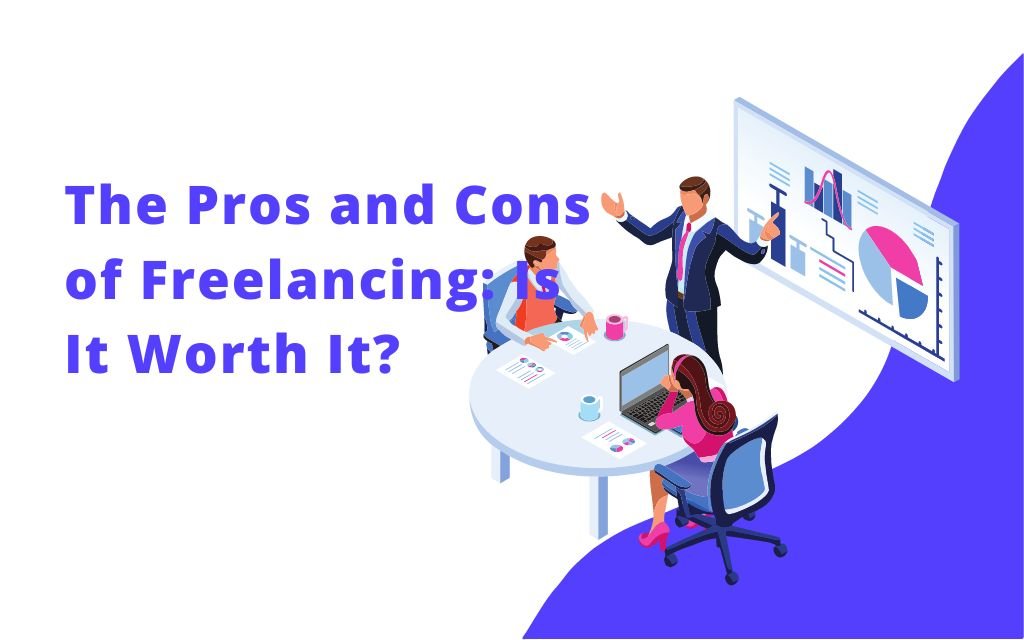Freelancing is a form of self-employment where you offer your skills and services to multiple clients on a project-by-project basis. You are not bound by an employment contract or a fixed schedule. You have the freedom to choose your own projects, rates and working hours.
Freelancing is becoming more popular and mainstream as technology enables more people to work remotely and independently. According to Upwork, 36% of the U.S. workforce freelanced in 2020, contributing $1.2 trillion to the economy.
But is freelancing worth it? What are the benefits and drawbacks of working as a freelancer? How do you know if freelancing is right for you?
In this blog post, we will explore the pros and cons of freelancing and help you decide whether it’s a good fit for your career and lifestyle.
The Pros of Freelancing
Freelancing has many advantages that attract people from different backgrounds, industries and professions. Here are some of the main pros of freelancing:
Flexibility
One of the most significant advantages of freelancing is the flexibility it provides. Freelancers have the ability to work from home or any location with an internet connection and can often set their own schedules. This makes it easier to balance work with other obligations such as family, education or personal pursuits
Independence
Freelancers have more control over their work and can choose the projects they take on. They have the freedom to pursue their passions and specialize in a particular niche, which can lead to more fulfilling work and a stronger professional network23.
Potential for higher income
Freelancers often have the potential to earn more money than traditional employees, especially if they have a unique skill set or are in high demand. Additionally, freelancers can set their own rates and negotiate their pay, which can lead to higher earnings over time.
The Cons of Freelancing
Freelancing also has some disadvantages that may deter some people from pursuing it as a career option. Here are some of the main cons of freelancing:
Lack of stability
Freelancers do not have the same level of job security as traditional employees. They are not guaranteed a steady stream of work and may experience fluctuations in income. Additionally, they are responsible for their own benefits and may not have access to the same level of healthcare, retirement savings or other perks that traditional employees receive
Administrative tasks
Freelancers are responsible for managing their own finances, taxes and contracts. This can be time-consuming and may require hiring additional help or outsourcing tasks, which can eat into profits.
Isolation
Freelancers may feel isolated or lonely as they work alone most of the time. They may miss the social interaction and support that comes with working in a team or an organization.
Is Freelancing Right for You?
Freelancing is not for everyone. It requires a certain level of self-discipline, motivation, organization and resilience. It also involves taking risks, facing uncertainty and dealing with challenges.
To decide if freelancing is right for you, you need to consider your personality, skills, goals and situation. You need to ask yourself questions such as:
- Do you enjoy working independently or do you prefer working with others?
- Do you value flexibility or stability more?
- Do you have the skills and experience to offer valuable services to clients?
- Do you have the confidence and communication skills to market yourself and negotiate with clients?
- Do you have the financial resources and backup plan to cope with income fluctuations?
- Do you have the time and energy to manage your own business?
By answering these questions honestly, you can get a better idea of whether freelancing suits your needs and aspirations.
How to Start Freelancing
If you decide that freelancing is right for you, you need to take some steps to start your freelancing journey. Here are some tips on how to start freelancing:
- Decide what services you want to offer based on your skills, interests and market demand
- Build your portfolio by showcasing your previous work or creating new samples
- Set your rates by researching the market and considering your value and expenses
- Find clients by using online platforms, social media, referrals, cold outreach or networking events
- Manage your projects by communicating clearly, delivering quality work and asking for feedback
- Manage your finances by tracking your income and expenses, invoicing your clients and paying your taxes
Freelancing can be a rewarding career choice that offers many benefits such as flexibility, freedom, creativity and income potential. However, it also comes with many challenges such as lack of stability, administrative tasks and isolation.
To succeed as a freelancer, you need to weigh the pros and cons of freelancing and decide whether it’s worth it for you. You also need to take action and follow the steps to start freelancing.
Conclusion
Freelancing is a form of self-employment that offers many advantages and disadvantages. Freelancing can provide flexibility, independence and potential for higher income, but it can also entail lack of stability, administrative tasks and isolation. Freelancing is not for everyone and it requires a certain level of self-discipline, motivation, organization and resilience. To decide if freelancing is right for you, you need to consider your personality, skills, goals and situation. You also need to take action and follow the steps to start freelancing. Freelancing can be a rewarding career choice if you are willing to take the risks, face the challenges and enjoy the benefits.




